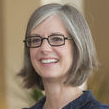Nancy Staudt, JD, Dean, Washington University Law School
As the community awaits the grand jury’s decision on whether to indict Darren Wilson, the police officer involved in the tragic shooting of Michael Brown, we at Washington University School of Law are actively engaged in ways to help our community.
As Washington University Chancellor Mark Wrighton has noted, the tragedy has highlighted the problems of racism, health disparities and uneven access to quality education, legal support and economic opportunity.
Building on our law school’s longstanding tradition of public service, our faculty, staff and students are playing an important role in both providing legal services to those in need and offering a legal context for the many underlying issues. Regardless of the outcomes that emerge from the grand jury and the Department of Justice investigations, we at Washington University believe that Ferguson has highlighted important systemic challenges throughout our urban core that must be addressed. Our university’s leadership also believes that faculty, students and staff have the opportunity to become better and stronger through an active and thoughtful response while fostering societal reform.
To that end, our university is supporting numerous initiatives, including:
• A student-led project that matches volunteers to groups and organizations committed to Ferguson and other related community-oriented initiatives.
• A library-led digitization project, which aims to preserve for posterity all the community and media-generated content emerging in response to Ferguson.
• A collaboration with a local organization to supply “comfort kits” to help children and families reduce stress and feel safe in their communities in times of crisis. Many more initiatives, news items and activities can be found on the university’s Ferguson-oriented website: voices.wustl.edu.
Our law school is also taking a leadership role through:
• Sponsoring a series of cross-disciplinary scholarly presentations on race, place, politics and violence, including presentations by the president of the NAACP Legal Defense and Educational Fund, Sherrilyn Ifill, and Columbia law professor Patricia Williams.
• Assembling faculty-led teach-ins on the role of the grand jury in criminal prosecutions.
• Enabling students to volunteer and collaborate with local public interest groups committed to providing legal services to individuals in need who live in Ferguson and in other surrounding areas of St. Louis.
Unfortunately, the recent tragic events are not unique to St. Louis. I believe that law schools here, and also across the entire country, have an important role to play. We can and must welcome and celebrate diversity of opinion; we can and we must make a conscious effort to include all people in our larger communities regardless of race, ethnicity, gender, religion, socioeconomic status, sexual orientation, or other differences.
Regardless of your viewpoint, it is important to listen, share and learn. Our law school stands ready to help build a stronger and greater community.
Read article in St. Louis Post-Dispatch
